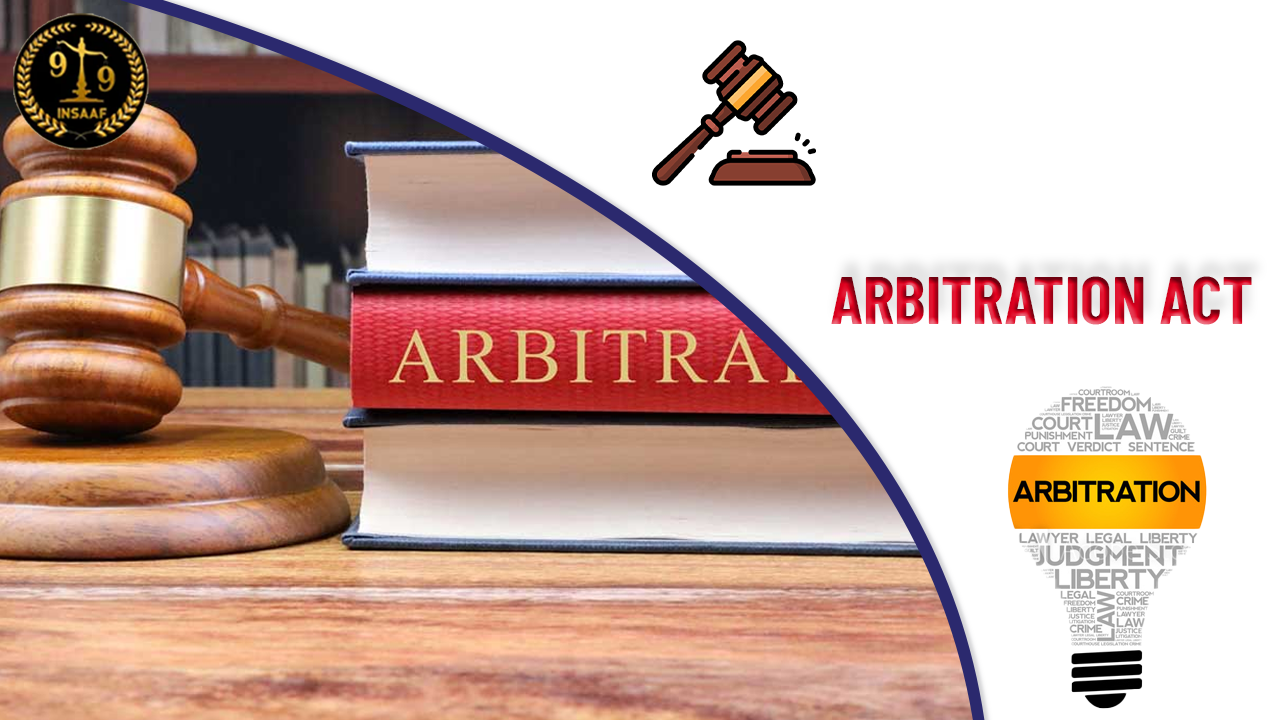

Online Legal Advice from Insaaf99® Online Lawyer Consultation in India


Online Legal Advice from Insaaf99® Online Lawyer Consultation in India

The Arbitration Act 1996 plays a crucial role in the world of dispute resolution, providing a clear set of arbitration rule's a popular alternative to traditional court cases. This important law gives parties a way to settle their disagreements fairly and privately outside the formal court system. It focuses on being efficient, flexible, and enforceable, making arbitration an attractive choice for resolving conflicts.
Arbitration offers several advantages, such as keeping disputes confidential, being faster than regular court cases, and allowing parties to choose expert arbitrators. The Act allows parties to customize the process to fit their specific needs, encouraging cooperation while preserving important business relationships. By understanding and utilizing the principles of the Arbitration Act 1996, individuals and businesses can take advantage of this effective and widely recognized method for resolving disputes.
Section 34 of the Arbitration Act 1996 allows parties to challenge arbitral awards in court on specific grounds, such as invalid arbitration agreements, procedural irregularities, a lack of appropriate notice, and questions of jurisdiction. Contesting an award under Section 34 is not an appeal on the merits of the case, but rather a review of the arbitration process. The party seeking to vacate the award must submit an application within a specified time frame, and the court will carefully examine the grounds raised. To maintain the efficacy and finality of the arbitration process, the Act restricts the scope of possible interventions. Parties involved in arbitration must understand the provisions and limitations of Section 34 to ensure a fair resolution and preserve the integrity of the alternative dispute resolution system.
Section 9 of the Arbitration Act 1996 allows parties involved in arbitration to seek interim relief from the courts to protect their rights and interests during ongoing proceedings. This provision enables parties to obtain restraining orders, injunctions, or asset preservation measures to prevent further harm or loss. The court's role in providing interim measures is critical in maintaining the status quo and ensuring fairness until the final arbitral award is rendered. It is important to understand that Section 9 does not involve the court in deciding the merits of the dispute; instead, it grants temporary relief until the arbitral tribunal can address the matter fully. By utilizing Section 9, parties can effectively safeguard their positions and interests during the arbitration process.
Section 11 of the Arbitration Act of 1996, which governs the selection of arbitrators, is crucial to the arbitration procedure. Arbitrators play a vital function in issuing impartial and just awards. When parties are unable to agree on an arbitrator, Section 11 permits them to ask the court to appoint one. When appointing arbitrators, the court takes into account factors such as expertise, independence, and impartiality. The Act also stipulates stringent deadlines to ensure a prompt resolution. By adhering to the criteria and procedure enumerated in Section 11, parties can secure qualified arbitrators, ensuring the integrity and efficacy of the arbitration process.
Section 17 of the Arbitration Act 1996 empowers the arbitral panel to undertake fair and efficient processes. Flexible and unbiased arbitration rules are set by the tribunal. Section 17 lets the tribunal issue interim measures and preliminary orders to preserve parties' interests during arbitration. These procedures preserve evidence, maintain the status quo, or prevent injury until the ultimate award. With these powers, the arbitral panel ensures a fair and trustworthy arbitration process.

Section 8 of the Arbitration Act 1996 helps arbitration agreements and contract arbitration clauses stay intact. Section 8 lets a party ask the court to postpone court proceedings started in violation of a valid arbitration agreement. According to the deal, the court will halt its actions and allow arbitration to resolve the disagreement. Section 8 allows the court to issue anti-suit injunctions to prevent parties from bringing legal actions in other jurisdictions that breach the arbitration agreement. Section 8 encourages arbitration by enforcing arbitration agreements and halting legal proceedings.
Section 37 of the Arbitration Act 1996 allows parties to challenge arbitration decisions in court, but there are limited reasons for doing so. If the arbitrator went beyond their authority, made serious mistakes, or didn't follow the rules, a party can appeal the decision. However, the court won't reconsider the facts or merits of the case. Its role is to ensure the arbitration was fair and lawful. Section 37 provides a way to seek fairness and fix any serious issues, but it's not a complete redo of the arbitration. It's there to protect parties while keeping the process efficient and final.
The Arbitration Act provides a framework to assure the fairness, efficiency, and enforceability of dispute resolution through arbitration, from gaining an understanding of the arbitration process to contesting arbitral verdicts. Arbitration is becoming more popular as a means of resolving disputes because of its emphasis on party autonomy, confidentiality, and expert decision-making. Arbitration is given more weight and parties' rights are better protected according to the Act's provisions like Sections 8, 9, 11, 17, and 37. With this whole understanding in hand, organizations and individuals alike can confidently accept arbitration as a trustworthy substitute for court action.
Insaaf99, an online legal consultation firm, plays a vital role in simplifying and facilitating the arbitration process for individuals and businesses. By leveraging the power of technology, Insaaf99 connects users with experienced and specialized arbitration experts who offer valuable guidance and insights.
Through its user-friendly platform, Insaaf99 provides a convenient and accessible means for clients to seek advice on arbitration-related matters. From understanding the nuances of an arbitration agreement to selecting arbitrators with relevant expertise, the firm's expert consultants assist clients every step of the way.
Insaaf99 empowers parties involved in arbitration to make informed decisions and navigate the intricacies of the process with confidence. With Insaaf99's support, individuals and businesses can embrace arbitration as an efficient and effective means of resolving disputes, ensuring justice and fairness in their legal matters.
Also Read